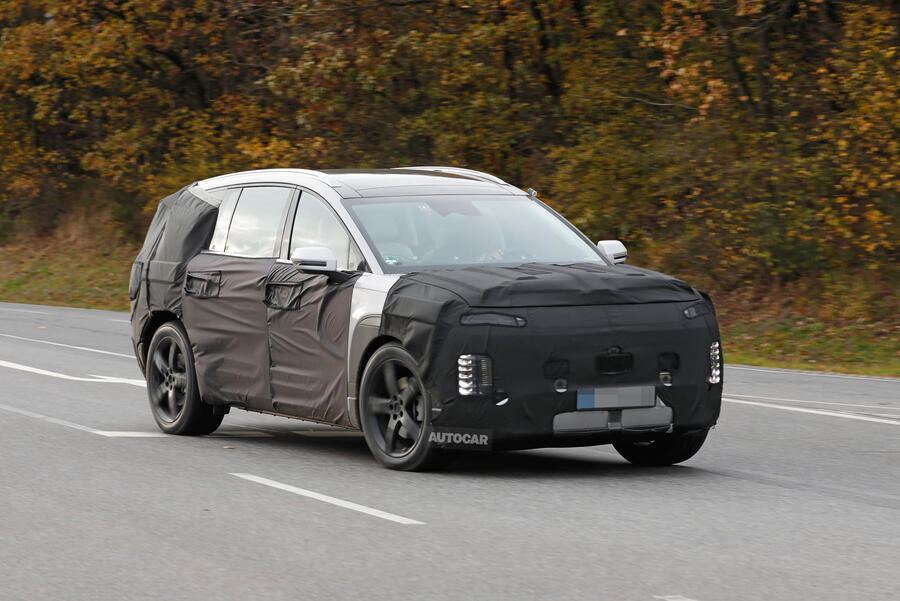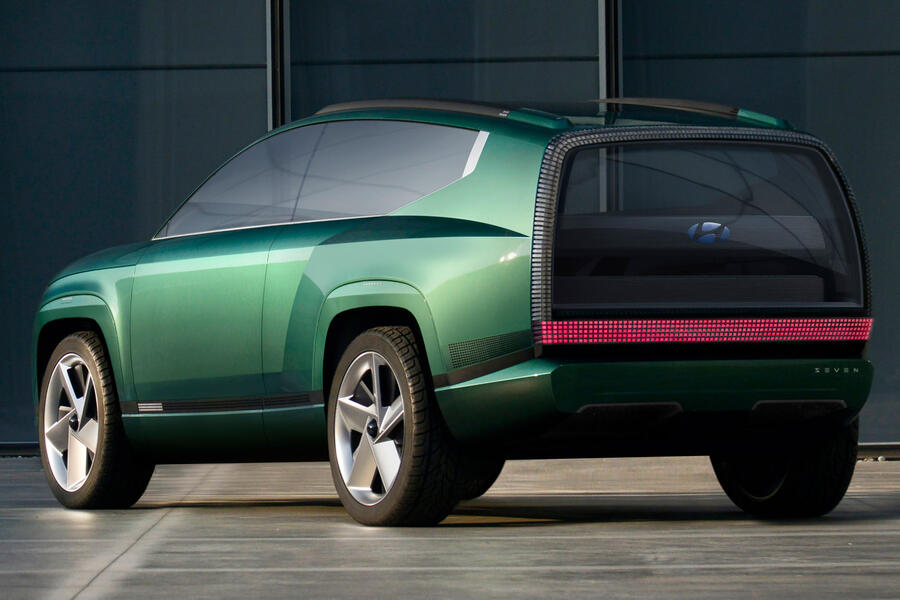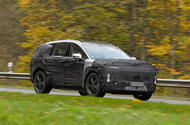New "category-bending" electric SUV set to arrive as a rival to the Volvo EX90
A pre-production prototype of the upcoming Hyundai Ioniq 7 has been pictured testing on public roads in Germany, ahead of a launch next year.Â
The electric SUV, which will share much of its underpinnings with the recently revealed Kia EV9, will arrive as the third car in the brand’s futuristic line-up of electric cars. It will sit above the Ioniq 5 crossover and Ioniq 6 coupé to provide a long-range rival to the Volvo EX90.Â
Despite much of the car’s design being obscured by fabric, the Ioniq 7 clearly shares many characteristics with the Hyundai Seven concept, which was revealed and presented to the public in the US in 2021.Â
Aspects derived from the concept are likely to include its large rear window, headlight details and wing mirrors, which are all on show in our set of images.Â
Back in 2021, the Korean marque labelled the concept as a "category-bending" electric SUV, highlighting its aerodynamically optimised styling and extended wheelbase as departures from the design norms of conventionally fuelled contemporaries.

Given the Ioniq 7 and EV9 are both based on the Hyundai-Kia E-GMP platform, it’s likely they both share the same powertrain set-up. The EV9 is powered by a 99.8kWh battery, offering 336 miles of range. Other markets get an entry-level car with a 76.1kWh battery.
It also features a choice of two powertrains: a rear-wheel-drive set-up with 200bhp and 258lb ft of torque, and a 378bhp, 442lb ft version with dual motors and four-wheel drive. In its most powerful spec, the EV9 can hit 0-62mph in 6.0sec.Â
Autocar previously reported that Hyundai planned for its first three bespoke EVs to have highly individualised styling, and indeed the Seven concept adopts a radically different silhouette – "divergent from a typical SUV", according to the firm – and a raft of new design cues to mark it out from both its range-mates and its fuel-burning forebears.
We can see the Ioniq 7 features a 'Parametric Pixel' design for the front and rear light clusters, a motif common to each of Hyundai's bespoke EVs, including its Heritage Series reborn classics – and is said to blend elements of "digital and analogue styles" and highlight the rigorous approach of its designers, who "considered every aspect of Seven's design, down to a single pixel".Â
Sitting atop Hyundai's EV-specific E-GMP architecture, the Ioniq 7, like the Seven concept, will benefit from a flat floor, short overhangs and bonnet, and, at least on the concept, a 3200mm-long wheelbase - roughly as long as that of even the largest version of the Mercedes-Benz S-Class. These are all features that allow for a much more spacious cabin environment than offered by Hyundai's existing SUVs.Â

It is in this respect that the production-spec Ioniq 7 will differ most obviously from the concept, which ditches a conventional three-row seating layout in favour of a more "fluid" format comprising a pair of movable, swivelling armchairs – complete with footrests – and a curved corner sofa-style arrangement at the back of the cabin.
On the Seven concept, a retractable joystick replaces the steering wheel, for example, and in place of a conventional dashboard, a sleek digital control panel spans the width of the cabin – an evolution of the set-up shown in the Prophecy concept – while a huge OLED screen in the ceiling serves as a sort of virtual sunroof with customisable displays.
With the front seats turned rearwards, the Seven is transformed into a mobile lounge, with ambient lighting supplied by distinctive tube-shaped devices in the door panels, an in-built fridge and even dedicated shoe care compartments.Â
Which of these, if any, will make it to production remains unclear, but Hyundai design boss SangYup Lee said the Seven "paves the way forward for what an SUV needs to become in the EV era", suggesting a similar ethos will be applied to production cars.
Also representative of Hyundai's wider approach to sustainability is the 'bio-paint' exterior finish, recycled interior materials and focus on hygiene.
For instance, an aircraft-inspired airflow system operates either horizontally or vertically to reduce cross-contamination between passengers, and once the vehicle is empty, UV lights run over all surfaces to eradicate bacteria and viruses.



